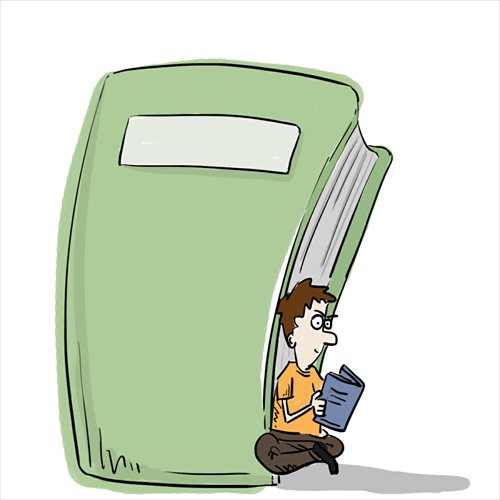
Illustration: Chen Xia/GT
The annual Shanghai Book Fair kicked off Wednesday and will run through August 25. Following its first day, I noticed that the latest round of selfies being shared on WeChat Moments were of adults or their children browsing books or attending events at the Shanghai Exhibition Center, where the book fair is being held.
Fed up with the hundreds of meaningless selfies I have to scroll through on a daily basis, usually of adult women making cutesy faces, it's a bit of a relief to see these same people now posing with books.
Even though WeChat's current scholarly atmosphere will probably only last until the end of the fair, it goes to show that Chinese people are in fact still interested in reading something other than social media status updates.
The Shanghai municipal government brands this book fair as shuxiang Shanghai, which directly translates as "book fragrance," which is another word for scholarly or literary. Indeed, the local government spares no expense or effort in continuing to uphold its long literary history.
The exhibition center, a landmark building on Yan'an Road Middle in Jing'an district, is no affordable venue; I doubt the fair organizers ever turn a profit by holding the annual exhibition there. But it is a testament to how important our city still takes literature.
China's traditional publishing industry, including brick-and-mortar bookshops, is in fact losing massive market share to online selling platforms and digital channels. This is probably why the Shanghai Book Fair is willing to offer steep discounts of at least 20 percent for the print versions of newly released works.
It's a logical assumption that the profit margin of publishing houses attending the fair is also not very high, but just being present and interacting with readers still offer much-needed exposure.
In Shanghai's traditional and new media this week, we are seeing a lot of coverage of the book fair, with the government calling on the public to come out and pay a visit to support China's publishers and authors.
A lot of this PR is being spent with tax payers' money, but I think most local residents can agree that it's a smart investment and one that will see very high returns, especially in the form of increased children's literacy.
Statistics show that in 2015, the number of books an average Chinese reads annually was just 4.58, a slight increase from 4.56 in 2014. Compared with other countries, China lags far behind in book reading.
Especially in these digital times, when most subway commuters are zombified by their smartphones, it's actually weird to see the occasional person still reading a paper book. Sometimes netizens will post snapshots of such "public book readers" on their accounts along with cheeky captions like "what a good habit," as if printed books were a new thing.
Every year I encourage my teenaged daughter to visit the Shanghai Book Fair, but I have to entice her to brave the long lines and sweltering summer by giving her an "unlimited budget" to spend on books there. More often than not, however, my husband and I are the only ones who end up reading most of her selections.
We Chinese love to decorate our homes and offices with big bookshelves filled with numerous modern and historic literary works, which gives our lives a scholarly atmosphere. But look closely at such bookshelves and you'll notice that most of the titles have never even been opened.
I'll be the first to admit that, in recent years, much of the time I fall asleep not holding a book in my hand like when I was a youth but while reading my WeChat.
I suspect that most of the "book selfies" I have been seeing since the Shanghai Book Fair started are also just like the bookcases in our homes - meant to make people think that we are well-read and spend our time consuming literature - while the reality is that we have all become addicted to our digital devices.
But as long as the Shanghai Book Fair continues to be an annual event in our city, I'll continue to buy more books than I actually read, and continue to decorate my home with them, as a testament to my deep sincere desire to someday throw away my smartphone and return to being a well-read person.
The opinions expressed in this article are the author's own and do not necessarily reflect the views of the Global Times.

